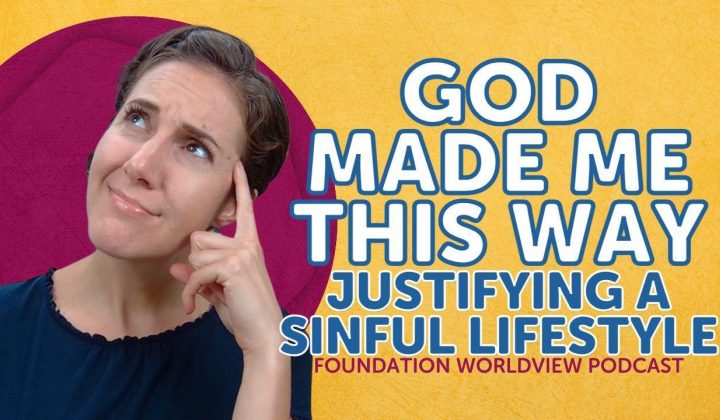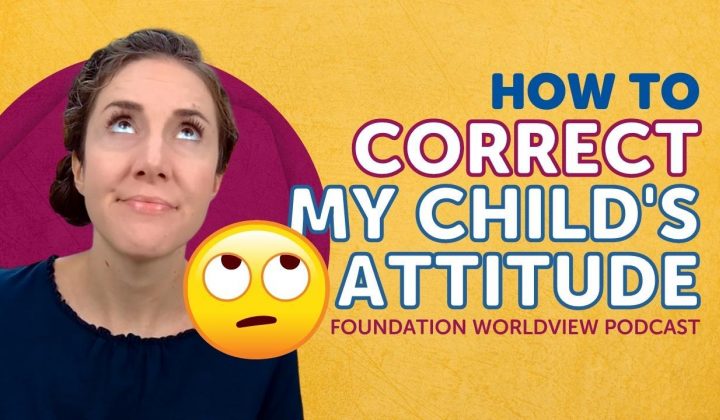Learn more about the journey that led to us equipping kids to carefully evaluate every idea they encounter.
Meet members of our team who have contributed to curriculum development.
Hear from real users of the Foundation Curriculum.
Learn what we believe about God, Jesus, Scripture, and more.
Addressing Guilt and Shame in Young Children
Today's question says, "My youngest son, who is four, always resorts to saying 'I'm a bad boy,' or 'I'm bad' whenever he gets in trouble. I've made very sure to never say that he is a bad kid, but that he's making bad choices. I try never to shame but point out sin. We talk about repentance and forgiveness, but he just keeps saying it. What should I do?"
Transcript
Note: The following is an auto-transcript of the podcast recording.
Hello friends, and welcome to another episode of the Foundation Worldview Podcast where we seek to answer your questions so that you can equip the children that God has placed in your care to carefully evaluate every idea they encounter and understand the truth of the biblical worldview. I'm your host, Elizabeth Urbanowicz and I'm thrilled that you've joined me for another episode today. Today's question says, "My youngest son, who is four, always resorts to saying 'I'm a bad boy,' or 'I'm bad' whenever he gets in trouble. I've made very sure to never say that he is a bad kid, but that he's making bad choices. I try never to shame but point out sin. We talk about repentance and forgiveness, but he just keeps saying it. What should I do?" Really important question because I'm sure many others are listening and watching who have encountered similar situations with the children that God has placed in your care. So we're going to dive down deep into answering that question today.
Now, the first thing I want to cover as we look at this question is something that I do think is a little bit of an error here. This questioner says I make sure to never say he's a bad kid, but that he's making bad choices. And so my question is, is this biblical? Is it biblical that we are not bad, but we just make bad choices? And I would argue that no, this is not biblical, that because we have inherited Adam's sin, we all by nature are morally corrupt, meaning that our flesh, our flesh is constantly driven against the things of God. So we all are actually inherently bad. We don't just make bad choices, but we have a corrupt nature. And so I would really encourage this questioner not to always put the focus simply on the choices. Is your son making sinful choices? Yes, he is, and it's important that he knows that. But we also need to recognize that we are inherently sinful. Now, does this mean that we're as bad as we could possibly be? No. Does this mean that we're not worth a lot? No. In fact, Scripture is clear that we bear the image of the holy God. Therefore we are valuable. We have value, dignity, and worth that no one can take away from us. In fact, we are so valuable that God sent his only son Jesus to redeem us. So we have to hold these two things in tension because that's what Scripture does, that we have this inherent value and that we are loved by God, but we are also corrupt in our nature. So that was the first thing I wanted to do just to clear up this error in the question.
Then the second thing I think we need to focus on is actually getting to the bottom of what this child or any child is saying. When they say that they are bad, what is your son actually meaning when he says, I'm a bad boy or I am bad? Now, if your son is four, it's probably not a great idea to sit down with him and just say, now what do you mean when you say that you're bad? Because most four year olds are not going to be able to verbalize this. I think that what can be really helpful when we're trying to get to the bottom of what a young child is saying, when they say something consistently, we can help get to what they're actually saying by giving them some options. Do you mean this or do you mean this or do you mean this? And especially with a 4-year-old, something that can be helpful is actually drawing pictures to represent these different options. Now, if we're just talking about getting to the bottom of what a four-year-old is saying, on any occasion, drawing pictures on every and any occasion is not realistic. However, when our kids say a phrase over and over and over and over again, such as I'm a bad boy or I'm bad, we can actually invest the time to get to the bottom of this.
So what I would recommend in this situation is that you focus on three different possible meanings of what he could mean and draw pictures for each of them. So you can ask him when you say you're a bad boy, do you mean that sometimes you sin and you can draw a picture of a boy being punished If you do a timeout, maybe you can draw a picture of a boy sitting in the timeout chair, or if you take away some other privilege, you can just draw a picture of that punishment. So do you mean sometimes I sin? A second option? Could be, do you mean I feel bad when I sin? And then you could draw a picture of a face that's crying. And then a third option could be, I think mommy and Jesus won't love me anymore when I sin. And for that you can have a picture of a cross and a mom that are xed out or you could have a picture of a heart that's Xed out. And so giving him pictures with these three options, sometimes I sin, I feel bad when I sin, and I think Jesus and mommy won't love me anymore when I sin. And then once you have identified what he means when he says this, then you can address it with Scripture.
So if he points to the picture that says, sometimes I sin, a passage that you can take him to is Romans chapter 3 verses 23 to 24. And you can read these verses to him and these verses say, "for all have sinned and fall short of the glory of God, and are justified by his grace as a gift, through the redemption that is in Christ Jesus." Now, is your 4-year-old going to understand this right away? No, you're probably going to have to read this verse several times and then to talk about what this verse teaches, that everyone sins, everyone is sinful, and there is no solution to that sin except Jesus. Again, that's everyone's sins. Everyone is sinful and there is no solution to that sin except Jesus. And so after you've gone through that verse with him and cover those three things, then you can say, you know what? Let's confess our sin to God right now and thank him for sending Jesus. And so you can pray with him. Give him an opportunity to confess his sin what he's done, and then thank God for sending Jesus.
If he points to the second option, the picture that represents I feel bad when I sin a passage that you can take him to is Ephesians chapter 2. Now, if we were talking about working with a kid who was seven on up, I would recommend reading Ephesians chapter 2 verses 1 through 5. However, since we're talking about a four-year-old, reading a super long passage of Scripture like that and having them glean things out of it is going to be difficult. So I would recommend with a 4-year-old just focusing on three verses focusing on verse 1, verse 4 and verse 5, and this passage says, "And you were dead in the trespasses and sins in which you once walked... But God, being rich in mercy, because of the great love with which he loved us, even when we were dead in our trespasses, made us alive together with Christ - by grace you have been saved". And again, you can read this passage to your son several times and then pull out what it talks about that sin leads to death because we are sinful. We are dead spiritually that sin separates us from God. And because of that we are right to feel guilty about our sin. We're right to feel guilty about our sin. But then comes in that God didn't just leave us stuck here in our sin. He sent Jesus to bear his wrath toward our sin. Okay, so to focus on sin leads to death. It separates us from God. So we are right to feel guilty about our sin, but God to not just leave us here stuck in our sin. He sent Jesus to bear his wrath toward our sin. And again, then you can spend time praying, confessing your sin to God and thanking him for sending Jesus.
I think sometimes in our culture we really get confused on this feeling of guilt. We're going to present it to a little one as I feel bad when I sin, but what we're talking about there is guilt. And sometimes we just think like, "oh, if we know Jesus, then we should never feel guilty."
I remember one time having a conversation with a friend and this friend had treated another one of our friends very terribly, and I had actually confronted this friend on it and she just kept ignoring what I said and kept ignoring the fact that she had treated this other friend terribly. Then this other friend moved away and we weren't in contact anymore. And the friend who had treated the other girl that moved away really terribly one day, she said, "oh, I just keep feeling this sense of shame and guilt over this, and I'm just tired of feeling this way." And she presented it as if she shouldn't have felt that way. And I said, "did you ever repent of your sin? Confess your sin to her and to God and repent of it?" And she said, no. And I said, "well then do you think feeling shame and guilt over this is a bad thing? Because if we have not confessed and repented of our sin, we should feel shame and we should feel guilt." Now, once we have confessed that to God and to the other person repented of it and asked for forgiveness, then any shame that we feel is from the enemy or from our own flesh, it's not from God because Romans chapter 8 verse 1 is very clear, "There is therefore now no condemnation for those who are in Christ Jesus." And so there's no condemnation. And when we have confessed and repented of our sin, we need to speak that truth over us to remind ourselves that we are not to feel guilty over it anymore because it's covered by the blood of Jesus. However, before we've done that, yes, we are right to feel shame and we are right to feel guilt, and we want to make sure that our kids understand this as well.
The third option, if your son points to the picture that represents, I think Jesus and Mommy won't love me anymore when I sin. Something that's really important to focus on is the character of God. And it's really important that our kids understand that one of God's attributes is that he is immutable, he is unchanging.
If you have never taken your little ones through our Foundation Attributes of God Curriculum, I highly, highly, highly recommend that you check this out because grounding our kids in the character and nature of God is so important for them to understand any other aspect of reality. And in the Attributes of God Curriculum, we spend an entire lesson focusing on the fact that God is immutable, that he's unchanging and what that means. And then we link back to that one lesson in almost all of the other lessons showing how God's character and nature is unchanging. It's immutable because God is immutable. So highly recommend that you check out Foundation Attributes of God Curriculum for your children four on up.
And once our kids have this understanding that God is immutable, we can take them to teach them that concept through to Hebrews 13:8, which says, "Jesus Christ is the same yesterday, today and forever". And then when they're worried Jesus is going to stop loving me when I sin, then we can take them to passages of Scripture that talk about God's great love for them. A passage that I think does this really well, if you take them to Lamentations chapter 3, verse 22, it says, "The steadfast love of the Lord never ceases; his mercies never come to an end." Then we can talk to our children about the fact that God loves them is never going to change because God never changes. And we can about how this is so different for us. We as humans, we are not immutable. We are constantly changing. And so our love is constantly changing. Sometimes we love others really well. Sometimes we stop loving others or sometimes we don't love others well. So our love is going to be up and down, up and down. However, God's love is constant because God's love is not based on who we are. It's based on who he is. And God is immutable. God never changes. So then you can help your son see that God's love never changes. So when we sin, God is ready to forgive us. His love never changes. And you know what? He sent Jesus before we had even turned from our sins. That's how great his love for us is.
And then you can explain to your son, because mommy loves Jesus. Mommy is never going to stop loving you. So because mommy loves Jesus, no matter how many times you sin, mommy is still going to love you because mommy's love for you comes out of mommy's love for God. And so to help your son understand that.
So just again in summary, when we have a question like this where our kids keep saying something and we're really not sure what they mean by it, it's really important for us to dive down deep into what do they actually mean. And when we're talking about kids like four, five, or six who might not be able to verbalize actually what they're thinking or feeling, it's helpful if we can draw pictures to represent different possible options and then have them point to the picture to help us understand what they mean.
And so it's important for us when our kids say that they're bad, that we understand that yes, actually you are bad, and I am bad because by nature we are sinners, but we are also God's image bearers, which means we have inherent dignity, value, and worth, and God loves us. In fact, God loves us so much that he sent his son Jesus to die for us, and that is what we want to consistently point our children toward.
Well, that's a wrap for today's episode. If you have a question that you would like for me to answer on a future Foundation Worldview podcast, you can submit that by going to FoundationWorldview.com/podcast. As we leave our time together, my prayer for you as always is that no matter the situation in which you and the children God has placed in your care find yourselves, you would trust that God is working all things together for your good by using all things to conform you more into the image of His Son. I'll see you next time.
Related Posts and insights

Talking To Kids About Their Sin Nature without Damaging Their Self-Esteem
In this episode of the Foundation Worldview podcast, host Elizabeth Urbanowicz answers a question that many Christian parents may have: how do we teach young children about their value and worth to God while also discussing the concept of sin?

God Made Me This Way: Justifying a Sinful Lifestyle
Today's question says, "Often in the media or in the mainstream world, we hear non-believers who latch onto this idea of the image of God and say, 'Well, I'm made in the image of God, so how can my lifestyle or any type of sin be wrong?' How do we talk to our kids about this?" Listen as Elizabeth Urbanowicz explores what it means to be created in God's image and our ability to sin.

How to Correct My Child's Attitude
Do your children get annoyed when you bring up the things of God? In this week's episode, Elizabeth Urbanowicz talks about how we can appropriately engage and correct our children's attitudes without feeling overbearing.





